Slate of Bills Would Affirm Illinois’ Status as a Competitive Leader on Equitable Climate & Energy Goals
Springfield, IL. — Sen. Villivalam, Sen. Villanueva, and Rep. Williams today joined the Illinois Clean Jobs Coalition (ICJC) to introduce the ICJC Platform—a slate of legislation outlining critical solutions in the power, buildings, and transportation sectors that accelerate Illinois’ climate, equity, and energy goals. Historic investments in clean energy through Illinois’ 2021 Climate and Equitable Jobs Act (CEJA) and the 2022 federal Inflation Reduction Act (IRA) have uniquely positioned Illinois to leverage our climate progress and competitively attract unprecedented jobs and federal investment. With the passage of the ICJC Platform, Illinois can lean into our strengths, double down on bold climate policy, and secure an equitable, affordable, and healthy future for all Illinoisans.
In the ICJC Platform, the Clean and Reliable Grid Act (SB3636), Clean and Healthy Buildings Act, and Clean and Equitable Transportation Act work together to tackle issues that impact Illinoisans in every facet of daily life. The Clean and Reliable Grid Act expedites our path to 100% clean renewable energy and strengthens the capacity and reliability of our electric grid.
“Illinois is already a leader on climate justice and workforce transition, but we still have work to do to secure a resilient, affordable power grid operating on 100 percent clean energy. We know that power grids in Illinois and across the country are outdated, inefficient, and increasingly vulnerable in extreme weather events, which are all the more common due to the effects of climate change,” said Representative Ann Williams, Chairwoman of the Energy and Environment Committee. “With the implementation of the Clean and Reliable Grid Act, we will reduce barriers to building necessary transmission lines, maximize energy efficiency policies, and offer customers options to save money on electricity. These sensible policies will support Illinois’ carbon reduction goals in the Climate and Equitable Jobs Act and enable us to rapidly modernize and electrify the buildings and transportation sectors. The Clean and Reliable Grid Act will ensure our electric grid is strong, reliable, and affordable so that we can tackle these new horizons in our clean energy economy.”
By improving Illinois’ electric grid and speeding up the approval and connection of clean energy projects, Illinois will be ready to capitalize on the benefits of transitioning the heating systems and appliances that power homes and buildings to clean energy. The Clean and Healthy Buildings Act will require gas utilities to reduce greenhouse gas emissions by 2050, require the Illinois Commerce Commission to embed affordability into ratemaking and decision-making, and help people lower their gas bills through gas energy efficiency standards.
“Just last year, following record-setting profits, all major Illinois gas utility companies sought historic rate hikes that resulted in a $813 million increase in utility customers’ annual bills. These rate hikes are particularly egregious when you consider dirty gas’s impact on our health and climate,” said State Sen. Celina Villanueva. “Not only are fossil fuels expensive, but burning them in our homes produces benzene, a known cancer-causing chemical, and has been linked to childhood asthma, which is more prevalent in communities of color.. Decarbonizing our heavily polluting buildings sector is the next urgent opportunity in climate action, and Illinois can once again lead the nation in equitable climate policy by passing the Clean and Healthy Buildings Act.”
While buildings contribute significantly to Illinois’ climate pollution, transportation is the state’s largest greenhouse gas (GHG) emissions source. The Clean and Equitable Transportation Act addresses vehicle pollution, going beyond electrifying vehicles to include comprehensive solutions.
“Sustainable transportation must be made a priority — it supports livable, walkable communities; enables equitable and affordable access to essential goods and services; underpins a vibrant economy; and improves public health,” said State Sen. Ram Villivalam. “We can transform our transportation system by electrifying public transit and also supporting equitable and affordable mobility opportunities. The status quo doesn’t work for current riders, potential new riders, or taxpayers. We need one agency that makes transit work better across Chicagoland. Reform must come first.”
“Illinois is the 7th most polluting state in the country. In 2021, we took a huge first step to address that by passing the Climate and Equitable Jobs Act. Now, we’re ready to take additional steps toward our clean and healthy future by ensuring our electric grid is strong and by tackling the buildings and transportation sectors that also heavily pollute our communities,” said Rosa Harper-Davis, an organizer with the Faith Coalition for the Common Good. “The ICJC Platform is a plan for the future. It’s a future where kids don’t suffer from asthma simply because of where they grew up. It’s a future where residents don’t have to walk a mile from their apartment building to the closest bus stop. It’s a future that we can build together.”
“Once again, the Illinois Clean Jobs Coalition, our partners and legislative champions have come together to develop a set of equitable, community-driven, comprehensive solutions to some of our state’s largest challenges,” said Jen Walling, Executive Director of the Illinois Environmental Council. “This slate of bills articulates a bold, pragmatic vision for how communities across Illinois expect us to extend our national leadership regarding equitable climate solutions and maintain Illinois’ competitive edge in attracting good-paying climate jobs and historic federal IRA investment to our state.”
Please find additional information about the ICJC Platform at ilcleanjobs.org/platform.
###

